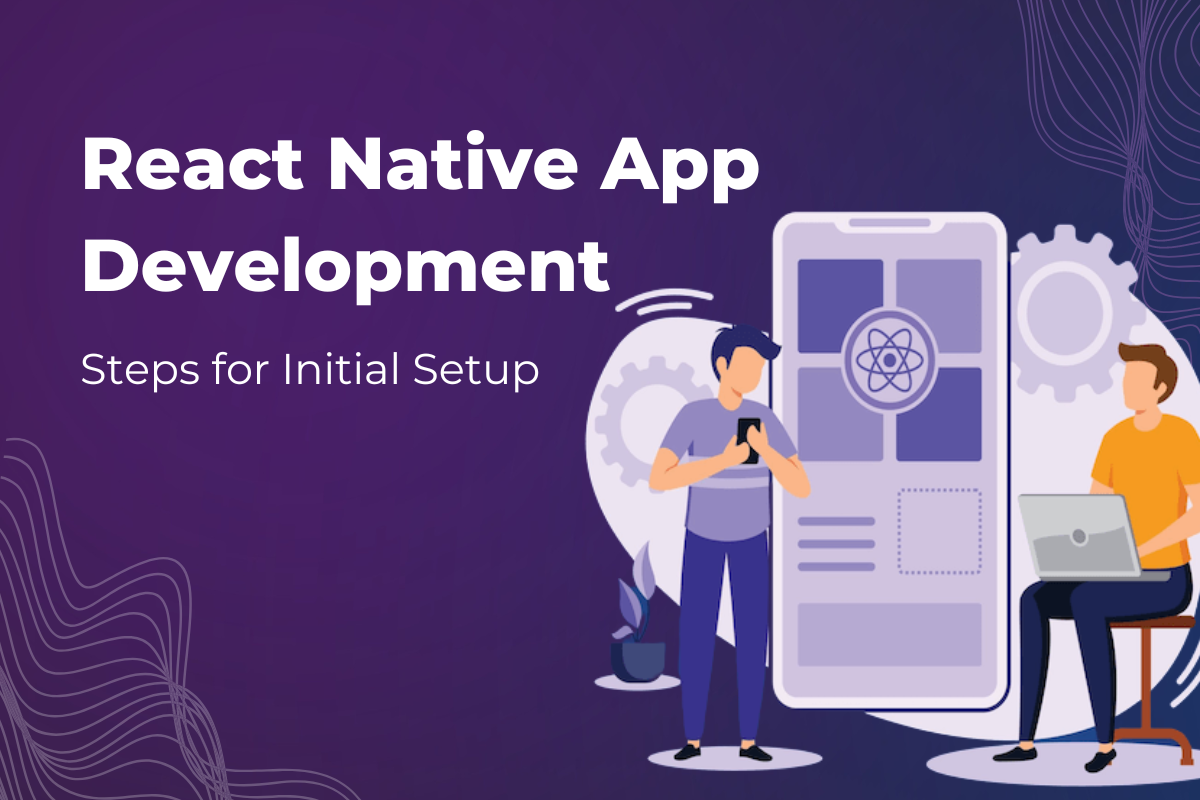Google App Store has got more than 5 million mobile apps. Some are exceptional; some are blunder, fail to work properly. There’s so much that goes into real masterpieces. Let’s get to know everything about it in this piece.
Introduction
At the times when we humans are confined to digital assets, it seems almost impossible to function without mobile apps! In the last few years, we humans underwent a dramatic shift to the internet and online services. This more than ever before dependence on digitized services has made businesses have mobile apps, particularly to resist and stay up with trends in the ultra-competitive digital landscape successfully. Nonetheless, this makes it vital to leverage the most of out it and tap a higher customer base.
Technology Being the Key Player in Mobile App Development
The global mobile app development market is growing and spreading like a wildfire and soon it is anticipated to reach almost 497.09 billion. Even though the spread of coronavirus has played an influential role in this industry but the potential businesses have seen in these times is incredible.
At this point, many often gets bewildered and wonders what precisely these mobile apps are, what benefits it brings to the table, which is the ideal technology to count on, and whether to go for iOS or Android or which app development framework would be the best to grab wider customer engagement.
"Mobile is the enabling centerpiece of digital convergence. Mobile is the glue for all other digital industries to use when approaching convergence, but mobile is also the digital gateway for the real world to join in this global metamorphosis of human behavior." - Quoted by Tomi Ahonen, consultant, and speaker
In this blog, we’ll discover the nitty-gritty of the mobile apps and their app development frameworks- native, hybrid, and cross-platform and decide which the ideal mobile app development framework is in 2021.
So, without any further ado, let’s get you started!
What Is A Mobile App?
A mobile app is a software intended to work on any platform. Even if apps are of smaller units rendering limited functionality, they still provide their users with quality services and satisfactory experiences. Contrary to all the beliefs, mobile apps provide isolated functionality, considering the services they’re offering in their business vertical.
Mobility is the prospect, so that's why the market for mobile app development is rising day by day.
To help recognize which would go best in your case, understanding the process and technologies behind it stands for great significance.
Talking about figures in mobile app development
Mobile app development industry is growing with every single passing minute. According to the sources, it has already reached the mark of $600 billion earlier this year and is supposed to reach new heights anytime soon. Not a small thing indeed; mobile app has brought a complete revolution and become a big trend!
To make things more transparent, here’re some more statistics.
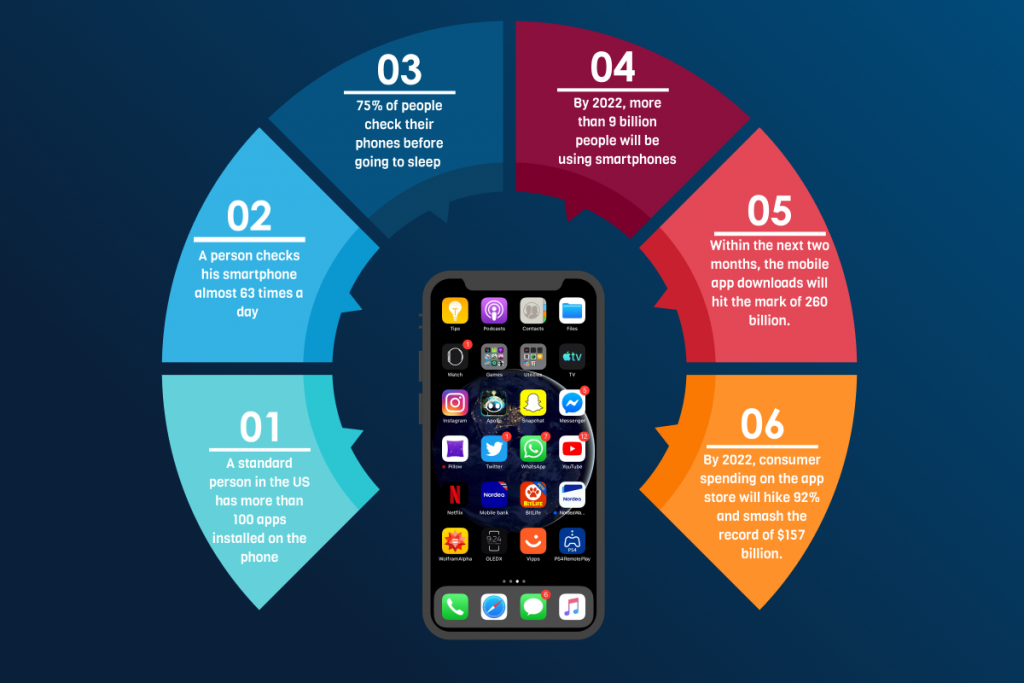
- A standard person in the US has more than 100 apps installed on the phone
- A person checks his smartphone almost 63 times a day
- 75% of people check their phones before going to sleep
- By 2022, more than 9billion people will be using smartphones
- Within the next two months, the mobile app downloads will hit the mark of 260 billion. That’s probably going to be the most significant rise.
- By 2022, consumer spending on the app store will hike 92% and smash the record of $157 billion.
Different Types of Mobile Applications
Mobile apps are in many different sizes and types. However, here’re the most common and popular among those all in the mobile ecosystem.
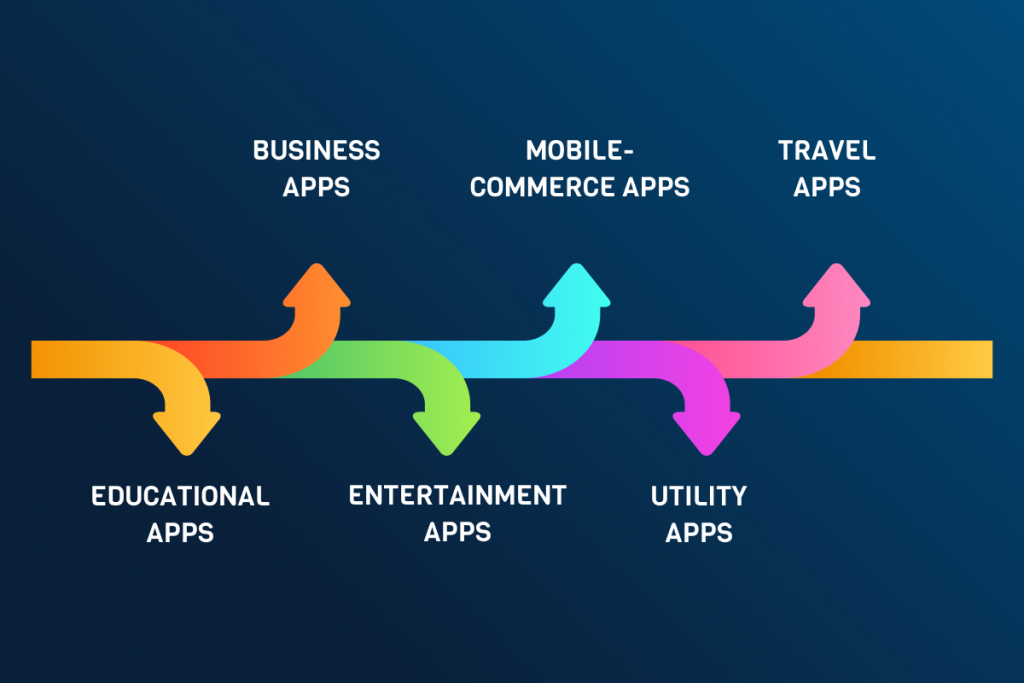
Business apps – This portion has got the biggest chunk in the marketplace as humans are more likely to use their smartphones to carry out innumerable jobs such as ordering food, online shopping, sending emails, and whatnot, with maximum ease and convenience. These business apps are the go-to options to increase business productivity and cut all the extra expenses while allowing users to perform an array of tasks efficiently.
Mobile-commerce apps – Two of the most popular and biggest shopping applications such as eBay and Amazon offer an intuitive desktop experience to all those who’re using it via mobile phone devices. These mobile commerce apps render users with easy access to products and services while ensuring seamless and quality payment gateways for a smooth-going shopping experience.
Travel apps – No wonders, these are in rage and take the mobile app development market to the new edge. The major idea behind the making of these apps is to make travel easier than ever. Get these apps into your smartphone and we’re certain you’ve got the complete travel guide and diary at your fingertips to discover anything & everything about the place. Many tourists these days make use of these apps to their best advantage.
Educational apps – This section has got mobile app covered that basically, aid users get new skills and knowledge on different subjects. For your reference, an incredible app named Vedantu has become an incredible source of information for kids looking for a quality learning experience. These apps are amazing tools for kids nowadays and many have been practicing them on an everyday basis to educate themselves. What’s more, the coronavirus pandemic has given a gigantic boost to these apps lately.
Entertainment apps – These are so obvious that let people stream video content, seek different events, and see some amazing content online. Two of the best examples of it are YouTube and Facebook. In addition, video streaming apps like Amazon Prime Video and Netflix have become extremely popular among users in the past few years.
Utility Apps –These ones are so common that we humans often barely even realize that we’re actually practicing them. The best thing they have got is – the shortest user session times to do the activities – we practice them way too often in our everyday lives and don’t even realize. Barcode scanners, healthcare apps, and trackers, home services app are some of the most popular utility applications today.

Fundamental Technologies for Mobile App Development
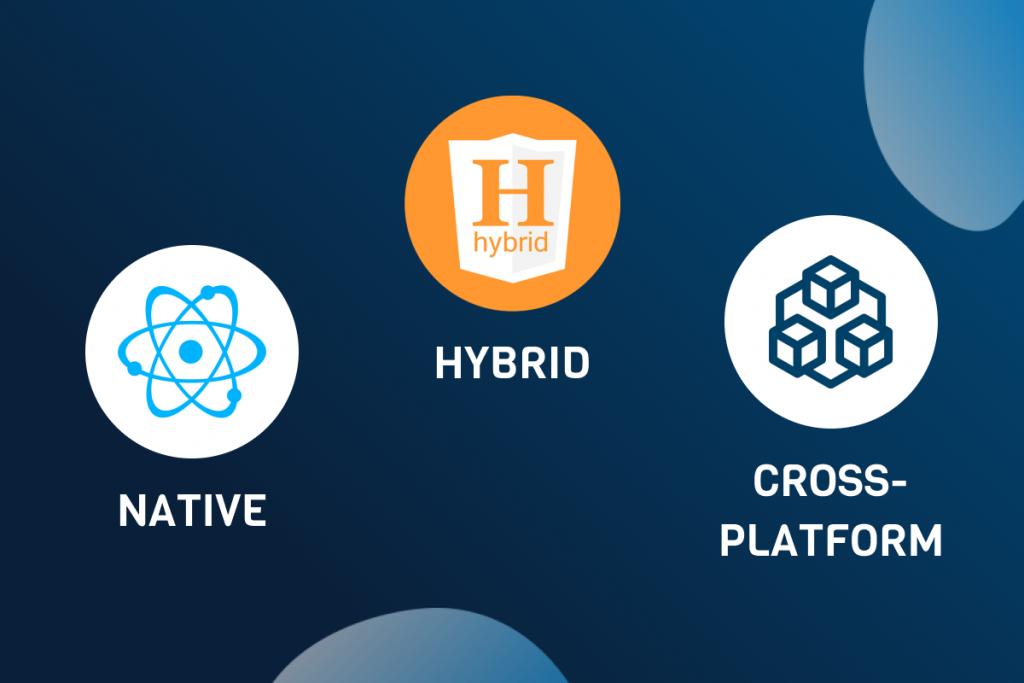
In order to get a better understanding of the process of creating a mobile app, here’s a technology consideration mobile app that every app designer ought to make before designing an app. However, it not just limits over, there’re many more essential elements in mobile app development.
What is the Native App Development Framework?
The native app development framework is the framework used to develop apps or software that need to be operated on specific devices and platforms. With native app development, developers rely on the native-to-the-operating-system programming language to craft apps that fit one particular platform- may it be desktops, smart TVs, smartphones, or any other advanced gadgets being used in the digital space.
When it comes to developing native apps for Android, Java or Kotlin are used, and in the case of iOS, Objective-C or Swift is used. The native app development framework is ideal when you wish to deliver the utmost user experience in terms of the appearance and feel of the application. For evolving startup businesses, hybrid app development is the perfect investment as it ensures high development speed and is budget-friendly.
The native app development framework is ideal for –
For startup businesses who have sufficient time and cost for app development and aren’t in a hurry to market their app, native app development frameworks can be considered a good fit for them to opt for. Native apps act as a future-proof investment that is highly secure, user-friendly and serves the target audience perfectly.
What is Hybrid App Development Framework?
Hybrid app development is the combination of native and web solutions where developers need to embed the code written with the languages such as CSS, HTML, and JavaScript into a native app with the help of plugins including Ionic’s Capacitor, Apache Cordova, and so on which enables to get the access of native functionalities.
With hybrid app development, the code is written only once, and the same code can be utilized for multiple platforms. Hybrid apps are capable of ensuring performance and user experience somewhat near to native apps, but when it comes to UX and navigation patterns, hybrid app development lacks in that scenario.
Hybrid app development framework is ideal for -
Businesses that wish to feature more stability and reliability and are looking for affordable yet quick mobile apps, hybrid app development framework.
What is a Cross-Platform App Development Framework?
For the newbies who might be assuming that hybrid and cross-platform app development frameworks are the same, both the frameworks play a different role and have entirely different meanings from each other. Cross-platform app development frameworks operate on the agenda to develop shareable and reusable code for building apps for different OS. Writing code once and reusing the same on multiple platforms helps in minimizing the development costs and efforts.
Cross-platform apps will ensure hassle-free implementation, robust functionality, and affordable production. However, don’t expect high performance and customization with a cross-platform app development framework.
Cross-platform app development framework is ideal for -
The business owners who plan to target an audience of multiple platforms at the same time and expect high performance with a confined budget, a cross-platform app development framework is the ideal framework to choose from.
Web Apps
These software applications function like native apps and operate on smartphone devices. But there have been so many differences between these two. First and foremost, web application runs on browsers and are written in HTML5, CSS, and JavaScript. These apps redirect a user to the link and give them a choice to get the app installed on their respective devices, requiring minimum memory.
As all the databases are saved on the server end, users will be only able to access the app with a stable internet connection. Arguably, this happens to be one of the biggest drawbacks of web applications.
Building a Mobile App
Planning to build a new app? Congratulations. In order to proceed ahead, you have got three different options and have to pick the one that seems the most ideal –
- Availing services of a professional mobile app development company
- Having an in-house development team
- Counting on freelancers to get the job done
Here, you’ll get an overview of each of these options with its advantages and disadvantages to help you come up with the most effective decision for your mobile app project.
Let’s get to know them!
Hiring a Professional Mobile App Development Company
Today there are innumerable professional agencies that specialize in the mobile app development niche. By collaborating with them and availing their optimum service, you’ll be assigning the task of building your business mobile app to a team of professionals who’re willing to put their best to render you some amazing results. Their broad range of services primarily includes services like:
- UI/UX Design Process
- Product Development (including front-end and back-end)
- Testing
- Quality Assurance

The major benefit you can reap via this option is you can take benefit of their extensive expertise and hands-on knowledge that they have had acquired in the past few years while working on projects like yours. However, it’s vital to have check with skills and experience beforehand to ensure smooth and quality experience ahead.
Proceeding ahead with this option gives the privilege of affordability and quality services, hence do consider opting for it.

Having Your Own In-House Mobile App Development Team
If you decide to opt for it, you will be having full control over the mobile app development process and guide what you want and whatnot. Nevertheless, this comes with a heavy price tag.

After all, in such a case you’ll be liable to pay their salaries, along with all the overhead costs including workspace, laptops, software licenses, and many other benefits. That would be hard, especially if you’re someone with a tight budget. Thus, if you decide to opt for this one, better be ready to have super-high funds.
Opting For A Freelancer To Get The Project Done
Unarguably, this one is going to be the cheapest option. By having a single liable person building your complete business mobile app, you will go through an extremely simple process. There’ll be no issues in the meanwhile, communication will be so easy and smooth because only one person is going to be there who will be liable for everything.

Nonetheless, hiring one skilled freelancer is a real challenge that must be overcome. In this case, you’re putting everything at stake, and dependent on a single person for the success of a mobile app. Too often there’re cases, when they might possess sound backend development knowledge but doesn’t have a vast knowledge of frontend - well, that’s where you’ve to save yourself.
Even though hiring a freelancer is cost-effective but it has got many risks. So, be extra cautious while going with this choice.
Advantages of Investing in Mobile Application Development Services
Going through this section will make it easy for business owners and market players to recognize the importance of an ideal mobile app development service to deliver an engaging design experience to their target audience. So, here you go!
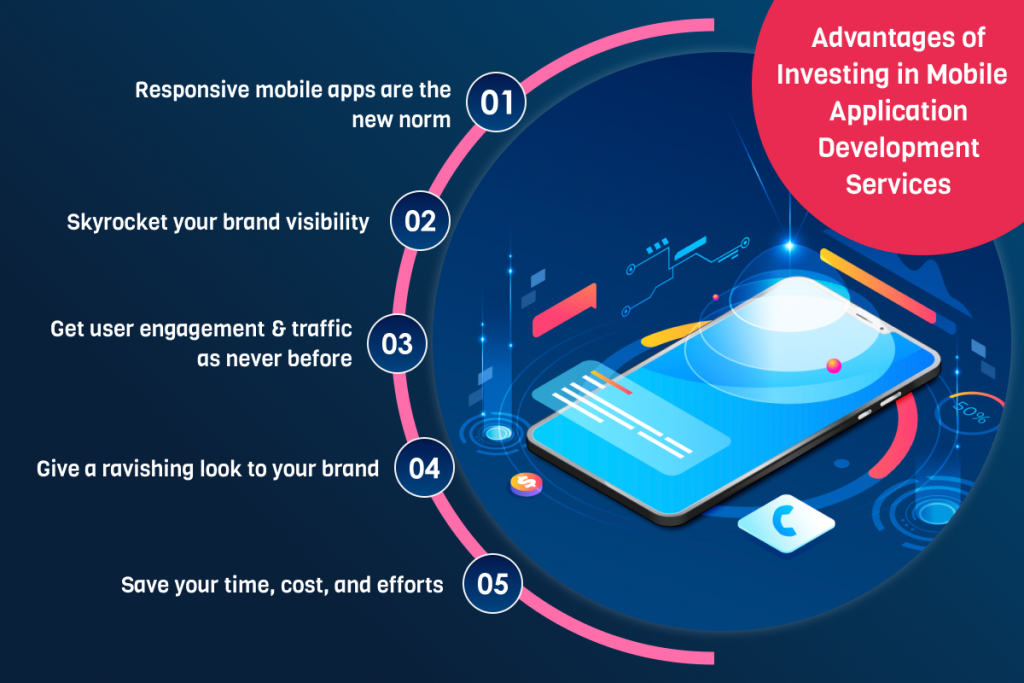
1. Responsive mobile apps are the new norm
With the growing adoption of digital devices all over the world, making your business website for PC users isn’t sufficient. You need to design a mobile application that works perfectly without any glitches on all the modern devices that include- laptops, smartphones, tablets, and so on. Investing in an ideal service provider can keep you covered in that case and assist you with the creative team of designers to develop a responsive mobile app for your business.
2. Skyrocket your brand visibility
Investing in a mobile app development process lets your business gain more visibility from local as well as global customers than ever before. This increases the chance of your business to improve brand visibility and gain a reputation in the market.
3. Get user engagement & traffic as never before
If your business website or mobile app has got an appealing UI/UX, the ball is already in your court. You get a higher chance of engaging more customers while retaining the existing ones with the help of professionals. Quality mobile app development services will help your business to stand out from the rest and get more traffic on the website as well as app.
4. Give a ravishing look to your brand
Whether it is the home screen design, menus, CTAs, landing page, app buttons, or the business logo, a mobile app development agency can keep you covered in all those scenarios and assist you to give an appealing identity to your unique business in the market. With this, you gain a better chance to reach the eyes of your target audience and convert them into loyal leads in the long run.
5. Save your time, cost, and efforts
Investing your time and efforts in a mobile app development process is a worthy investment that you won’t ever regret. For the startups and newbies, investing in itmight seem to be a waste of capital, but this is what will bring the perfect outputs for your business and accompany more customers to your business. Instead of investing in other time-consuming and expensive marketing methods, going for professionals is the best choice you must opt for.
The Verdict
As the digital world evolves with time, we will experience more and more technologies and trends in the mobile app development domain in the coming time. This arena has endless things coming in the way and will make our lives simpler, comfortable, secure, and smart than ever before. There’s no doubt that these mobile applications will shape the future. Leveraging technology in the business world is simply a win-win idea that accompanies endless benefits for the industry in the long run.
I hope this guide helps you understand all about the mobile app development landscape in today’s time. In the time coming by, we are supposed to see even more innovative mobile applications reaping the maximum out of the amazing technologies.
Got any concerns or questions related to your business mobile app? Drop us a message at the top priority inbox today.
Drive more value in your digital journey with us! Got any views or concerns to share?
Frequently Asked Questions
What are the different types of apps?
There are many different types of apps. However, the most common ones are –
- Desktop apps (that are solely built for computers)
- Mobile apps (that are intended for smartphones)
- Web apps (these are basically browser-based programs)
What are some examples of mobile apps?
Every industry has got different mobile apps that happen to work best. Some of the top examples are-
- Google Earth (Android & IOS)
- Book My Show (Android & IOS)
- Google Play (Android & IOS)
- YouTube (Android & IOS)
- Paytm (Android & IOS)
How do I download mobile apps?
That’s simple; you may get access to mobile apps easily on Google PlayStore (in Android) and Safari (in iOS). All you need to download these mobile apps is a stable internet connection and storage in your device.
What are mobile applications used for?
They’re used for different purposes, integrating services a client is providing to its end-users.
Which is the best mobile app?
According to the survey done some years back, the best mobile app is found to be Google Pay.
How to learn mobile app development?
To start with, you can join various communities, opt for online mobile app development programs tutorials, go through innumerable vlogs on YouTube and read current news and trends on it. There are also free courses available to learn mobile app development.
How to build a mobile application?
If you’re someone who’s planning to get a mobile app, you can basically opt for one of these options out of these three –
- Having an in-house development team to fulfill your business mobile app needs
- Hiring a specialized and professional mobile app development service provider
- Relying on the expertise and services of freelancers



